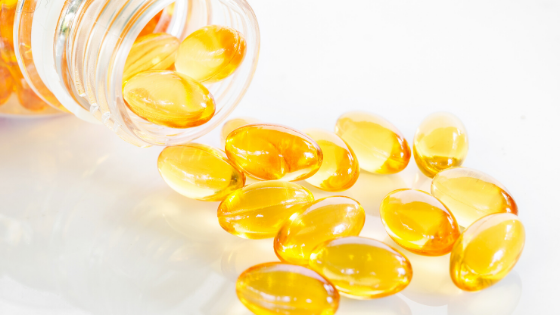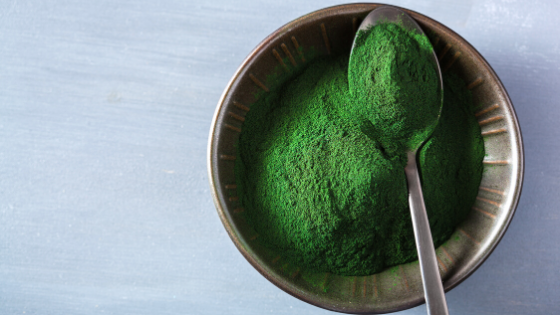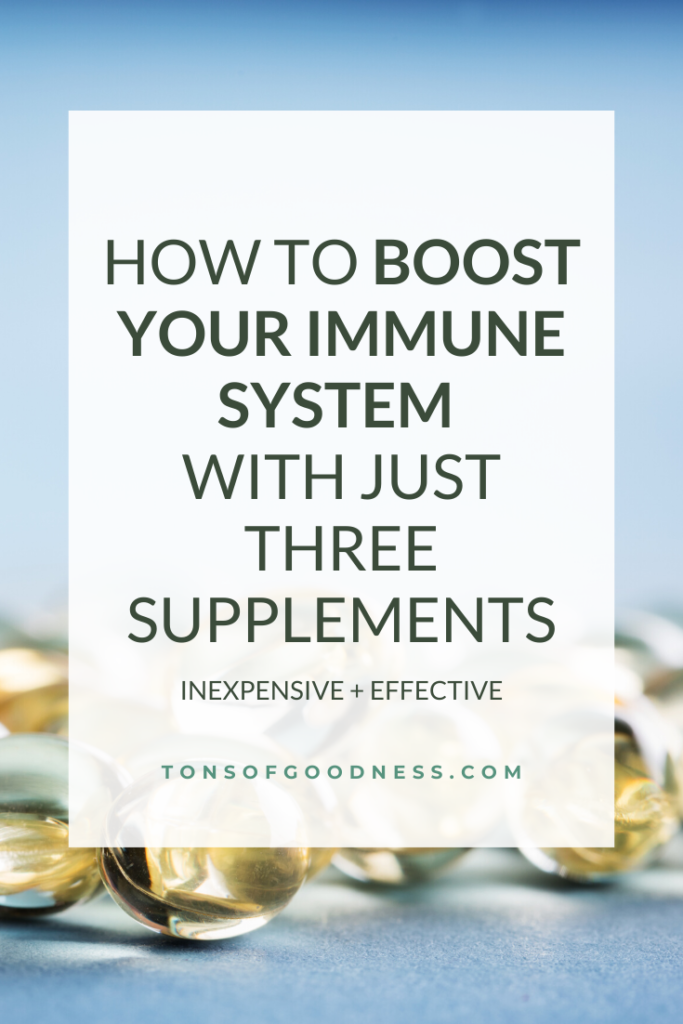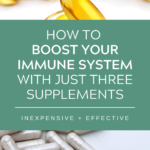Disclosure: Some of the links in this article are affiliate links, which means that if you purchase through those links I will receive a small commission. For example, as Amazon Associate, I earn from qualifying purchases. If you decide to use these links, thank you!
There are hundreds of supplements on the market that claim they boost your immune system. And while they may all help in their own unique way, some of them are expensive and some may not be as effective as others. With this article, I will provide you with the top three supplements to boost your immune system. These are easy to find on Amazon or at your local drugstore. They are also research-based and cost-effective.
These are the supplements that I take every day, so I have provided links to the specific products that I use and the products that my daughter uses.
I began using these three supplements for immune system health after consulting with my nutritionist a few years ago. I also shared this information with my physician and chiropractor who said they would recommend these supplements when asked how to boost your immune system.
How to Boost Your Immune System with Just Three Supplements
VITAMIN D

It’s well known that Vitamin D is important for the growth and development of bones and teeth. However, Vitamin D is also vital for promoting normal immune system function and resistance against certain diseases and cancers (source).
Several studies have shown that low levels of Vitamin D are linked to infection including upper respiratory infection and higher rates of influenza (source). There is also evidence linking Vitamin D deficiency to autoimmune conditions, such as multiple sclerosis, rheumatoid arthritis, and Hashimoto’s Thyroiditis (source) (source).
Vitamin D is also important for cognitive function and mental well-being (source) (source).
Vitamin D is naturally produced by your body in response to sunlight. However, most people don’t get adequate amounts from the sun alone. This is due to wearing sunscreen, spending time indoors, living in areas that are not sunny year-round, etc.
How much Vitamin D do you need?
The amount of vitamin D you need each day depends on your age and health conditions. So, it’s a good idea to check your Vitamin D level periodically to make sure you’re taking the amount that is best for you.
In general, according to the Institute of Medicine (source), these are the recommended amounts of Vitamin D for each age group:
- Age 1-3 years: adequate intake, 600 IU/day; maximum safe upper level of intake, 2,500 IU/day
- Age 4-8 years: adequate intake, 600 IU/day; maximum safe upper level of intake, 3,000 IU/day
- Age 9-70: adequate intake, 600 IU/day; maximum safe upper level of intake, 4,000 IU/day
- Age 71+ years: adequate intake, 800 IU/day; maximum safe upper level of intake, 4,000 IU/day
While these are the recommended amounts, other professionals say that for adults 1,000 to 2,000 IU daily is the ideal range for almost all healthy adults. This is about the amount your body will synthesize from 15 to 30 minutes of sun exposure two to three times a week.
As mentioned, it is important to talk with your doctor and have your Vitamin D levels checked.
For example, I was already taking 1000 IU of Vitamin D daily, however, my bloodwork indicated that my levels fell in the borderline to low range. My physician informed me that the optimal Vitamin D supplement for me contains 5000 IU (125mcg)
It’s also essential to take Vitamin D along with Vitamin K-2, which is needed for Vitamin D to function properly (source).
The brand that I use is Now Foods, which you can find on Amazon by following these links:
PROBIOTICS

Like Vitamin D, probiotics are important to your health in many ways. They work by helping to restore beneficial bacteria to your microbiome. By doing this, they can help to digest food, fight harmful bacteria, and regulate the immune system.
Probiotics give your immune system a boost by inhibiting the growth of harmful gut bacteria (source). Also, some probiotics have been shown to promote the production of natural antibodies in the body (source).
What are the best sources of probiotics?
Probiotics are live microorganisms that you can consume through fermented foods or supplements.
The top food sources include:
- yogurt, especially plain Greek yogurt
- kefir, a tangy dairy drink
- fermented vegetables such as pickles or sauerkraut
How to choose a supplement:
According to the Cleveland Clinic, a probiotic product must contain live and active bacterial cultures. A general recommendation is to choose probiotic products with at least 1 billion colony forming units and containing the genus Lactobacillus, Bifidobacterium or Saccharomyces boulardii, some of the most researched probiotics.
It’s also important to know that if you are on any type of immunosuppressant medication or are immunosuppressed, you should consult with your doctor about probiotics before you take them.
The brand that I use is Now Foods, which you can find on Amazon by following these links:
OMEGA-3 FATTY ACIDS

Next on the list of vitamins and supplements that can help boost your immune system is omega-3 fatty acids. Omega-3 fatty acids are incredibly important for your entire body and your brain.
One of its important functions is supporting immune cell function (source). Omega-3 is also known to reduce symptoms especially in diseases related to inflammation, allergy, and autoimmunity (source).
There is also preliminary research indicating that omega-3 fatty acids can suppress the growth and spread of cancer cells (source). It is thought that this might be because of the way in which omega-3 fatty acids support the body’s immune and anti-inflammatory system.
What are the best sources of omega-3 fatty acids?
Omega-3s are found naturally in some foods. You can get adequate amounts of omega-3s by eating a variety of foods, including fish and other seafood (especially cold-water fatty fish, such as salmon, mackerel, tuna, herring, and sardines).
If you don’t enjoy eating fish, then you may prefer to take an Omega-3 supplement.
Omega-3 dietary supplements include fish oil, krill oil, cod liver oil, and algal oil (a vegetarian source that comes from algae). According to the National Institute for Health, these are two things to look for when purchasing an omega-3 supplement:
- A combination of eicosapentaenoic acid (EPA) and docosahexaenoic acid (DHA). Each of these fatty acids provides different health benefits.
- A quality supplement. Good quality indicators are seals from U.S. Pharmacopeia, NSF International, or ConsumerLab.com.
The brand that I use is Now Foods, which you can find on Amazon by following these links:
Bonus Supplement – Spirulina

I couldn’t write an article about strengthening your immune system without mentioning Spirulina. Spirulina is a unique blue-green algae that grows naturally in oceans and salty lakes in subtropical climates and derives its energy from the sun. It has been consumed for centuries due to its high nutritional value and health benefits.
As I mentioned in my previous post, Spirulina Benefits: Nature’s Superfood Supplement, spirulina contains potent nutrients known as polysaccharides which are a powerful immune system booster. Studies have shown that supplementation of spirulina may alleviate anemia and immunological dysfunction in individuals over the age of 50. Another study found that spirulina may be effective and efficient in delaying HIV disease progression by improvement in the immune response.
Other studies confirm and support spirulina’s benefits as a powerful immune booster, showing it can combat Candida overgrowth and encourage a healthy gut microbiome.
I use a teaspoon of spirulina powder in my protein shake every morning. For more information check out this post:
Spirulina Benefits: Nature’s Superfood Supplement
My top choice for a spirulina supplement (the one I use every single day) is this powder from Nutrex Hawaii:
Other Ways to Strengthen Your Immune System Without Supplements
While taking these supplements will boost your immune system, it’s also important to live a healthy lifestyle. This is because every part of your body functions better when you follow these strategies:
- Take steps to avoid infection, such as washing your hands frequently and cooking meats thoroughly.
- Exercise regularly.
- Don’t smoke.
- Eat a diet high in fruits and vegetables.
- If you drink alcohol, drink only in moderation.
- Get adequate sleep.
- Try to minimize stress.
Summary of How to Boost Your Immune System
The top three supplements to boost your immune system are Vitamin D, probiotics, and omega-3 fatty acids. I also love spirulina because it really is nature’s superfood supplement. With these supplements and a healthy lifestyle, you are taking action to support your immune system and your health.
You may also like:
The 9 Best Vegan Protein Powders You Will Absolutely Love
Your Guide to Meal Planning for a Healthy Week
*Please note that the information in this blog post should not be used to diagnose, treat, prevent or cure any disease or condition. This information is not a substitute for medical advice from your health care professional. For more details see my medical disclaimer.




So informative! It’s so good to know this specially during this time of the year, when looking after our immune system is key❤️ Thanks girl ❤️